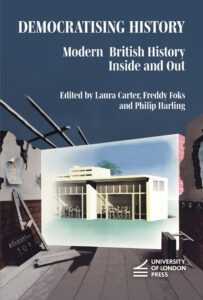Présentation
How has democracy transformed modern Britain and the way we teach its history? Democratising History answers this question by showcasing how scholars have successfully united social and cultural histories of democracy in British history. Nine research-led chapters provide an ‘inside’ perspective on democracy in modern British history, covering the complex relationship between Britain and its Empire, the democratisation of metropolitan culture, and how experts aimed to inform public debate in a changing democratic society. An ‘outside’ perspective is brought by six interludes that engage with the democratising forces at work in the twenty-first-century academy that are reshaping the profession, and thus the histories that scholars produce. In bringing these two histories of democracy together within a single conceptual framework, this book narrates an important shift in the landscape of UK higher education from the ‘inside’ and the ‘outside’, insisting that professional and intellectual changes must be seen alongside one another. Collectively, this volume responds to the scholarly and professional contributions of Peter Mandler, whose sensitive readings of cultural discourses and their social reach has inspired a generation of modern British historians. Through novel methods, insightful case studies and broader reflections on the profession, it shows how modern British history is being transformed by these questions and wider social and economic changes in contemporary Britain.
Table des matières
Introduction: Democratising history inside and out
Laura Carter and Freddy Foks
Interlude a. New Challenges: Teaching Modern History in a ‘new university’
Iwan Morgan
Part I. Victorian Britain, progress, and the wider world
1 Opium, ‘civilisation’, and the Anglo-Chinese Wars, 1839–1860
Philip Harling
2 Archibald Alison’s Revolution
Ben Weinstein
Interlude b. Peter and the Special Relationship
Deborah Cohen, Guy Ortolano and Susan Pedersen
Part II. Culture, consumption and democratisation in Britain since the nineteenth century
Interlude c. Olden Times and Changing Times: Museum interpretation and display in twenty-first century Britain
Rebecca Lyons
3 Painting for pleasure: The rise and decline of the amateur artist in Victorian Britain
Sally Woodcock
4 Collecting for the Nation: The National Art Collections Fund and the gallery-visiting public in interwar Britain
Heidi Egginton
Interlude d. Professionalisation, publishing and policy: Peter Mandler and the Royal Historical Society
Margot Finn and Richard Fisher
Part III. ‘Experts’ and their publics in twentieth-century Britain
Interlude e. Accountability and double counting in research funding for UK higher education: The case of the Global Challenges Research Fund
Ambreena Manji
5 Reluctant pioneers: British anthropologists amongst the Natives of Modern Japan, c. 1929–1930
Chika Tonooka
6 An American Mass Observer among the natives: Robert Jackson Alexander in World War Two Britain
Lawrence Black
7 Architecture and sociology: Oliver Cox and Mass Observation
Otto Saumarez Smith
8 Re-reading “race relations research”: Journalism, social science, and separateness
Christopher Hilliard
Interlude f. The Historical Association, schools, and the history curriculum
Andrew Stacey-Chapman and Rebecca Sullivan
9 ‘Democracy’ and ‘expertise’ in two secondary modern schools in Liverpool, 1930–1967
Rosie Germain

